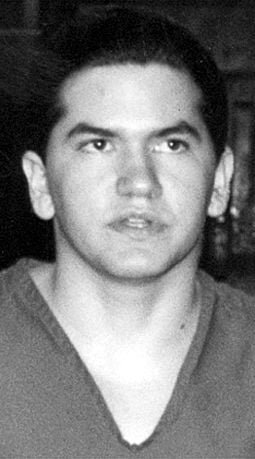Victim: Kipp Earl Gullett, 18
Murders: Dale Dwayne Craig, 17 years, 11 months, and three weeks; Zebbie Wayne Berthelot, 16; James Conrad Lavigne, 19; and Roy Maurer
Crime date: September 15, 1992
Crime location: Baton Rouge
Crimes: Carjacking, kidnapping, robbery, murder, and witness elimination
Murder method: Three gunshots to the head
Weapon: Several firearms including a 9 millimeter pistol
Murder motivation: Robbery and witness elimination
Sentence: Craig–Death later reduced to life in prison; Berthelot–20 years

Summary
On the evening of September 14, 1992, the assailants went on a hunt for a car to steal. They came across Kipp, who was driving a Ford Bronco. They kidnapped Kipp at gunpoint from the Louisiana State University campus and drove him around. During his captivity, 18-year-old Kipp cried and pleaded for his life. But his pleas went disregarded. The captors drove him to a secluded construction site and Craig and Lavigne marched him out of his vehicle at gunpoint. Lavigne pistol-whipped him and left him. Craig, who was one week away from turning 18, decided to murder Kipp to prevent him from identifying the assailants. As Kipp lay on the ground in a fetal position, Craig shot him three times in the head. Berthelot pleaded guilty in exchange for a 20-year sentence while Craig went to trial and was convicted. He was sentenced to death but had his death sentence overturned after the Supreme Court abolished the juvenile death penalty. He was then sentenced to life in prison and may soon be paroled due to recent changes in Louisiana law.

Details
Craig, who was just one week away from his 18th birthday, decided he needed to obtain a car to visit his girlfriend. On the evening of September 14, 1992, the offenders lurked in parking lots in search of a car to steal. At around midnight, they came across their victim, Kipp Gullett, in the parking lot of the Kirby Smith dormitory on the Louisiana State University campus. Kipp was an 18-year-old LSU freshman. He was returning to his room in his Ford Bronco after visiting with his friend. As he began to exit his truck, Craig rushed up and struck him in the face with a pistol. He then screamed for his accomplices to get into Kipp’s truck. Craig held his gun to Kipp’s head in the back of the truck while the others entered. Maurer proceeded to drive them out of the parking lot.
As they were driving, Kipp pled with his kidnappers. The terrified teenager offered his captors his money and his truck and told them that his parents were rich and would pay for his safe return. He also attempted to keep his face hidden in his hands to convince the assailants that he would not be able to identify them if they were to release him. Craig forced him to sit up straight to “look normal.”
Young Kipp continued to cry and beg for mercy. Craig probed him for information on whether his disappearance would be noticed. He also asked him if he had “gotten any” from his girlfriend that evening.
As the attackers drove around town in search of a gas station without too many cars or people around, they debated what to do with Kipp. Craig expressed a desire to murder him while his co-defendants suggested beating him unconscious. Either way, it would not end well for Kipp.
The kidnappers drove Kipp to a secluded construction site near South Kenilworth Crossing in East Baton Rouge Parish. Craig and Lavigne, both of whom had handguns, pulled Kipp from the truck and marched him to a grassy area at gunpoint. Lavigne used the butt of the gun to strike Kipp in his head, causing him to fall to the ground. Lavigne began to return to the Bronco. Kipp now lay on the ground, curled up in a fetal position. Craig knelt at his side. He fired five shots, three of which pierced Kipp’s head, murdering him execution-style.
The attackers drove away from the murder scene. Craig informed his accomplices that he had killed the boy to protect their identities. He then told them, “I love you all, you are my boys. If you say one f___ing word, I’ll kill you, too.” He next asked if they should go kill anybody else while they were at it, but then decided against it, saying, “No, the game warden might get pissed.” Craig went on to drive Kipp’s Bronco to visit his girlfriend and told her about the crime in detail. He admitted that he decided to kill Kipp because one of the others had used an identifying name.
Lavigne was convicted of second-degree murder and sentenced to life in prison while Maurer and Berthelot pleaded guilty to manslaughter and were sentenced to 20 years. Craig was convicted of first-degree murder in 1994 and sentenced to death. His death sentence was overturned after the Supreme Court ruled that the death penalty was unconstitutional when imposed on juveniles. Craig’s life sentence was upheld by a three-judge court of appeals panel which stated that the sentence was not unconstitutionally excessive or “grossly disproportionate” to the severity of the crime. But because of recent changes in Louisiana law, Craig may soon be paroled.
Appeals Panel Refuses To Reduce Life Sentence
October 28, 2006 at 10:46 PM CDT – Updated June 30 at 6:00 PM
BATON ROUGE (AP) – A state appeals court panel has refused to reduce the sentence of a man serving life in prison for the 1992 shooting death of an LSU student.
Dale Dwayne Craig had asked the state First Circuit Court of Appeals to reconsider the sentence, arguing it is unconstitutionally excessive. Last year, Craig was spared from the death penalty, after the U.S. Supreme Court decided that penalty could not be applied to anyone who was younger than 18 at the time of a crime. Craig was 17 when Kipp Gullett was shot and killed.
But, in a decision this week, a three-judge appeals court panel ruled Craig’s life sentence was not unconstitutionally excessive or “grossly disproportionate” to the severity of the crime. According to court records, Craig and three accomplices abducted Gullett from a campus parking lot, before Craig shot Gullett to death.
Court records indicate Craig also threatened to kill those with him if they spoke.
State v. Craig
On September 14, 1992, defendant Dale Dwayne Craig brutally murdered Kipp E. Gullet, an 18 year-old freshman student at Louisiana State University. For that crime, defendant was convicted of first degree murder and sentenced to death. This is a direct appeal from that conviction and sentence. La. Const. art. V, § 5(D). Finding no reversible error in any of the numerous assignments of error, both argued and unargued, we affirm both the conviction and the sentence.
FACTS
The defendant, Dale Dwayne Craig, and three others, Zebbie Berthelot, James Conrad Lavigne and Roy Maurer, were indicted for the first degree murder of Kipp E. Gullet. The latter three negotiated a deal with the District Attorney; Lavigne and Berthelot testified against defendant at trial.
Pursuant to the state’s Giglio notice,Giglio v. United States, 405 U.S. 150 (1972), in exchange for truthful testimony at defendant’s trial, Lavigne would not receive the death penalty (no other commitments were made); Maurer would receive a 25 year sentence (no commitment as to the charge); and Berthelot would also receive a 25 year sentence (no commitment as to the charge). Maurer did not testify; the reason is not clear from the record.
Near midnight on September 14, 1992, the victim, Kipp Gullet, drove his Ford Bronco into the parking lot of Kirby Smith dormitory on the Baton Rouge campus of Louisiana State University. Gullet, a freshman, was returning to his room after visiting with his friend, Christy White. As Gullet began to exit his truck, defendant rushed up and struck him in the face with a pistol. Defendant and his companions had spent much of the evening lurking in parking lots looking for a car to steal because defendant needed transportation to visit his girlfriend.
Screaming for his companions to get into Gullet’s truck, defendant held his gun to Gullet’s head in the back of the truck while the others got in the truck and Maurer drove them out of the parking lot. As they were driving, Gullet pled with his captors, offering them his money and his truck and telling them that his parents were rich and would pay for his safe return. The victim also attempted to keep his face hidden in his hands in an effort to convince his captors that he would not be able to identify them if they were to let him go, but defendant made him sit up straight to “look normal.” While the victim continued to cry and beg for mercy, defendant probed him for information on whether his disappearance would be noticed. He also asked the victim if he had “gotten any” from his girlfriend that evening.
As the group drove around town looking for a gas station without too many cars or people around, defendant and his companions debated the fate of the victim. Defendant expressed his decision to kill the victim, but the others suggested beating him into unconsciousness. Defendant seemed to acquiesce, and they drove to a secluded construction site near South Kenilworth Crossing in East Baton Rouge Parish. Defendant and Lavigne, both armed with handguns, pulled the victim from the vehicle and marched him at gunpoint away from the truck. They reached a grassy area where Lavigne struck the victim in the head with the butt of his gun. The victim fell to the ground and Lavigne began to walk back to the Bronco. As the victim lay on the ground in a fetal position, defendant knelt at his side and fired three bullets through his head, killing him.
The four drove quickly away from the scene. Defendant told his friends that he had killed the boy to protect their identities. Defendant then said to the group, “I love you all, you are my boys. If you say one f___ing word, I’ll kill you, too.” To Maurer, he said, “I told you I was hard.” Defendant then asked if the group should go kill anybody else while they were at it, then answered his own question by responding, “No, the game warden might get pissed.”
Defendant drove the Bronco to visit his girlfriend, who was at his house. He told her, in detail, of his crime and of how he decided to kill his victim when one of the others had used an identifying name. Defendant and his girlfriend then planned to drive the Bronco to Bogalusa the next day. The following day, however, defendant changed his mind as they began to leave and decided instead to destroy the Bronco. Defendant ripped the stereo speakers and stereo from the car. Accompanied by his mother, his girlfriend, and Lavigne, who all followed in a separate car, defendant took the truck to the levee, where he set fire to the vehicle. Police later found at defendant’s residence, through the execution of a search warrant, the pieces of stereo equipment and the victim’s keys.
Defendant’s girlfriend (Nicole Craig), whom he married one day after the crime, waived any claim of spousal privilege and testified against defendant at trial.
Soon after daybreak, the East Baton Rouge Parish Sheriff’s Department investigated the suspected arson of a Ford Bronco found burning at the foot of the Mississippi River levee. Deputies discovered that the registered owner was the victim’s father and that the truck was supposed to be in the possession of his son. After Ronald Gullet (the victim’s father) was notified concerning the vehicle, he contacted the Louisiana State University Police Department to relate that he was unable to locate his son. Simultaneously, deputies were investigating reports of a body found at a construction site near the Kenilworth Ridge Apartments. Officers conducting the two investigations quickly realized the connection between the two crimes and identified the body as Kipp Gullet.
Based upon information from an anonymous caller, who stated that defendant Craig, Lavigne, Maurer and Berthelot were involved in the incident, police quickly arrested the four suspects. Berthelot, who was only 15 at the time, confessed to the officers in the presence of his mother. Based upon this statement and a subsequent statement given by Maurer, the police arrested defendant, who was charged with first degree murder.
Defendant initially pleaded not guilty, but later attempted to enter a plea of guilty, skip the guilt phase of the trial, and go straight to the penalty phase. The trial judge refused his attempted plea of guilty and the case went to trial. Defendant was found guilty of first degree murder on October 20, 1994, after a three-day trial. Following another three-day penalty phase, the jury found as aggravating factors that the crime was committed in the course of an aggravated kidnapping and armed robbery, and that the offense was committed in an especially heinous, atrocious and cruel manner. The jury unanimously determined that defendant should receive the death sentence, which the district judge thereafter imposed. Defendant now perfects his appeal in this Court on the basis of 57 argued and unargued assignments of error.
Man convicted in execution-style killing of LSU student asks for new trial with new judge
Twenty-five years ago in an attempt to avoid a death sentence, Dale Dwayne Craig’s trial attorneys stood before a jury and admitted the Baton Rouge man’s guilt in the 1992 carjacking and execution-style killing of LSU freshman Kipp Earl Gullett.
Craig was nevertheless convicted of first-degree murder and condemned to die, but the U.S. Supreme Court later turned the death sentence into a life term when it struck down the death penalty for juveniles. Craig was 17 when he killed Gullett.
Now, Craig is seeking a new trial by claiming his trial lawyers didn’t have his consent to concede his guilt to an East Baton Rouge Parish jury in 1994.
Craig’s bid for a new trial is based on a 2018 U.S. Supreme Court ruling in a Louisiana case that says a defense attorney cannot admit his client’s guilt to a jury over the client’s objection.
In conjunction with his request for a new trial, the 44-year-old Craig doesn’t want the Baton Rouge judge who has presided over the case from its inception to consider his request.
So state District Judge Bonnie Jackson on Wednesday said she will refer Craig’s recusal motion to retired state District Judge Tony Marabella, who is currently serving as a temporary judge on the 19th Judicial District Court.
Craig’s current attorney, John Landis, argues Jackson must be disqualified from considering his new trial request because she is a witness to what his trial lawyers did in relation to conceding his guilt to the jury.
The state Attorney General’s Office is opposing Craig’s recusal motion, with Assistant Attorneys General Andrea Barient and Colin Clark arguing in court papers that “the facts alleged in his motion to recuse do not show that her testimony will be either required or helpful.”
Craig, however, contends Jackson was personally involved in arranging courthouse meetings between Craig and several individuals — including his mother, a spiritual adviser, a social worker and a convicted felon released after spending 40 years in prison — for the purpose of persuading him to agree to plead guilty.
Craig also is awaiting a Supreme Court-mandated resentencing. The high court ruled in 2012 that automatic life prison terms for juvenile killers are unconstitutional and said they are entitled to hearings to try to show they are capable of reform.
The Attorney General’s Office is pushing for a sentence of life without parole for Craig.
Craig was a week shy of his 18th birthday when he fatally shot Gullett, of Pineville, after carjacking the 18-year-old student from the Kirby Smith Hall dormitory parking lot on LSU’s campus on Sept. 15, 1992.
Gullett was killed at an isolated construction site on South Kenilworth Parkway after he was beaten, pistol-whipped and had begged for his life, trial testimony showed.
Prosecutors said Craig wanted Gullett’s Ford Bronco.
Three others ranging in age from 16 to 19 at the time of Gullett’s death were convicted in the case: James Conrad Lavigne was found guilty of second-degree murder and sentenced to life; and Roy Maurer and Zebbie Berthelot pleaded guilty to manslaughter and received 20-year prison terms.
Maurer, who drove the Bronco to and from the murder scene, testified against Craig, as did Berthelot.
Attorney: Baton Rouge man serving life for 1992 slaying of LSU freshman now has ‘path to parole’
- BY JOE GYAN JR. | STAFF WRITER
- PUBLISHED DEC 25, 2020 AT 10:00 AM |
A Baton Rouge man once on death row and currently serving a life prison term for the 1992 execution-style killing of an LSU freshman now has a “path to parole” that he did not have before, his attorney says.
That path, according to Dale Dwayne Craig’s appellate lawyer, came through recently enacted state legislation that expands parole eligibility for certain juvenile offenders.
Craig, 46, was a week shy of his 18th birthday when he fatally shot Kipp Earl Gullett, 18, of Pineville, after carjacking him from the Kirby Smith Hall dormitory parking lot Sept. 15, 1992.
Gullett was killed at an isolated construction site on South Kenilworth Parkway after he was beaten, pistol-whipped and had begged for his life, according to trial testimony.
Craig wanted Gullett’s Ford Bronco, prosecutors argued.
House Bill 173 of this year’s regular legislative session, which the governor signed into law in June as Act 99 and which took effect Aug. 1, added a new subsection to a 2017 statute dealing with parole eligibility.
The new subsection reads as follows: “Notwithstanding any provision of law to the contrary, any person serving a term or terms of imprisonment that result in a period of incarceration of twenty-five years or more and who was under the age of eighteen years at the time of the commission of the offense shall be eligible for parole consideration pursuant to the provisions of this Subsection if all of the following conditions have been met.”
One of those conditions requires the offender to have served at least 25 years of the sentence imposed.
“Mr. Craig has served 26 years of a life sentence for a crime committed when he was a child,” New Orleans lawyer John Landis, who represents Craig, states in a motion filed at the 19th Judicial District Court in Baton Rouge.
The motion asks the court to declare that Craig is parole eligible under La. R.S. 15:574.4(J) — the new subsection that went into effect in August — and that he will be entitled to a parole hearing once he satisfies the conditions spelled out in Act 99.
Landis acknowledges that another subsection, La. R.S. 15:574(A)(2), of the 2017 parole eligibility statute excluded persons serving life sentences “unless the sentence has been commuted to a fixed term of years.”
But Landis argues that the word “notwithstanding” in La. R.S. 15:574.4(J) trumps the language of La. R.S. 15:574(A)(2).
“The ‘notwithstanding’ clause at the beginning of 15:574.4(J) specifies that the statute supersedes any other law with which it may conflict, removing any doubt that 15:574.4(J) is the prevailing statute in this area of law,” he writes.
“This new subsection of the statute clearly and unambiguously extends parole eligibility to individuals like Mr. Craig, who were sentenced to life imprisonment for crimes they committed while they were juveniles,” Landis claims.
Cory Dennis, a spokesman for state Attorney General Jeff Landry, said Tuesday that the Attorney General’s Office intends to respond to Craig’s motion “at the appropriate time.”
Landis, who declined to elaborate on his motion, points out in the filing that there is a difference between being parole eligible under a statute and being subject to immediate parole.
The new parole eligibility subsection that took effect Aug. 1 includes requirements that must be met before an inmate may be set for a parole hearing, he says.
“The ability to get a parole hearing is triggered once the … requirements are met,” he writes. “In other words, R.S. 15:574.4(J) provides Mr. Craig a path to obtaining parole.”
Some of the other requirements are that the offender has obtained a “low-risk level designation” determined by a validated risk assessment tool approved by the state Department of Public Safety and Corrections secretary; and that the offender has completed a reentry program to be determined by DPSC.
An East Baton Rouge Parish jury convicted Craig of first-degree murder in 1994 and condemned him to die, but the U.S. Supreme Court later turned the death sentence into a life term when it struck down the death penalty for juvenile killers.
Craig is currently awaiting a Supreme Court-mandated resentencing.
The high court ruled in 2012 that automatic life prison terms for juvenile killers are unconstitutional and said they are entitled to hearings to try to show they are capable of reform.
The Attorney General’s Office is advocating for a sentence of life without parole for Craig.
Three others ranging in age from 16 to 19 at the time of Gullett’s death were convicted in the case: James Conrad Lavigne was found guilty of second-degree murder and sentenced to life; and Roy Maurer and Zebbie Berthelot pleaded guilty to manslaughter and received 20-year prison terms.











